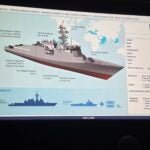
The commandant of the Marine Corps this week said unmanned teaming and increased artificial intelligence (AI) is needed to maintain superiority over China in the future. “I’m a believer in manned and unmanned teaming, I think that’s where we’re headed. But technologies are not going to replace the individual Marine, of course. It will enable the Marine to be more lethal,” Gen. David Berger said Tuesday during the National Defense Industrial Association’s 2021 Virtual Expeditionary Warfare Conference. Berger highlighted a…

 By
By 











